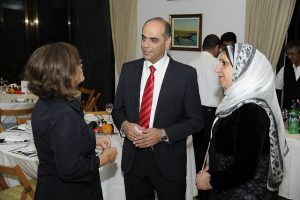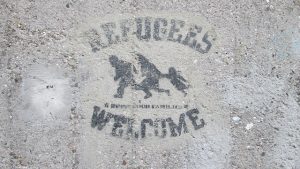Revised Common Lectionary Reflection, 7th Sunday after the Epiphany, Year A
February 19, 2017
Lessons: Leviticus 19:1-2, 9-10, Psalm 119:33-40, 1 Corinthians 3:10-11, 16-23, Matthew 5:38-48
Theme: God’s faithful and generous people understand that we are stewards of one another, and that we seek to love and pray for friend and foe alike.
Key Scripture: You have heard that it was said, “You shall love your neighbor and hate your enemy.” But I say to you, Love your enemies and pray for those who persecute you, so that you may be children of your Father in heaven; for he makes his sun rise on the evil and on the good, and sends rain on the righteous and on the unrighteous. Matthew 5:43-45
Preaching/Teaching Reflection
Loving and caring for your neighbor is an important aspect of stewardship. Yes, that’s correct. Stewardship is part of everything we say and do and every decision we make. God has entrusted much to us, and that includes one another. And if you think being a good steward of financial resources is tough, how much more difficult do you think it is to be a good steward of the one who is different from you, much less one whom you consider to be your enemy?
 Jesus clearly cares about how we treat one another. The “Sermon on the Mount” is full of teachings about proper human relationships. He begins many by referring to traditional law, saying, “You have heard that it was said.” Following the letter and spirit of the law is tough enough, but Jesus ups the ante considerably by doing what he does so well: drawing the circle of inclusion ever wider. Most people pride themselves on being good, law-abiding citizens, but it’s not enough simply to avoid doing harm to one’s neighbor. Jesus calls us also to work actively on behalf of our neighbors, to seek their good, and even to pray for those who torment or would harm us. This is one tall order.
Jesus clearly cares about how we treat one another. The “Sermon on the Mount” is full of teachings about proper human relationships. He begins many by referring to traditional law, saying, “You have heard that it was said.” Following the letter and spirit of the law is tough enough, but Jesus ups the ante considerably by doing what he does so well: drawing the circle of inclusion ever wider. Most people pride themselves on being good, law-abiding citizens, but it’s not enough simply to avoid doing harm to one’s neighbor. Jesus calls us also to work actively on behalf of our neighbors, to seek their good, and even to pray for those who torment or would harm us. This is one tall order.
All one has to do is turn on the news or scroll through a Twitter feed to see horrific stories of the injustices we humans heap upon others. From Chicago to Aleppo and points everywhere in between, humankind’s inhumanity to humankind fills daily headlines. Hatred and dissent find expression and claim permission in“-isms” of race, class, gender, sexual identity, religion, and politics, often thinly veiled under the supposed mantle of Christianity. Jesus, however, commands us to love our neighbors—not seek to do harm to them. As one of my favorite bumper stickers quips: “When Jesus said, ‘Love your enemies,’ I think he probably meant don’t kill them.” Even so, almost every day it seems there’s a new story of hate and strife directed at one’s neighbor who is somehow different or “less than,” and therefore dismissed or outright loathed.
I’m not suggesting that the average citizen is going to run out and commit murder or even openly hate and scorn their neighbors. Most people are able to control the more base aspects of their inner beings. “Respectable” folk are at least able to hide hate and fear under masks of respectability or behind ready rationalizations and easy excuses. It’s the more subtle ways we hate our neighbors that Jesus tries to address in this week’s gospel lesson. It’s the easy assumptions we make, the haste with which we dismiss, ignore, or brush away our neighbors’ plight, and the stereotypes and ignorance under which we operate.
To be a steward of one’s neighbor implies getting to know others, to seek understanding and common ground. It means praying for the welfare of those one does not know and bridging the gap by finding ways to  enter into relationship and learn from each other. It means seeing the image of God and the face of Christ in everyone, and it means stepping way out of our secure personal space and cultural comfort zones. It means acknowledging and working to move beyond racism, sexism, ageism, and all of our other “isms” and schisms.
enter into relationship and learn from each other. It means seeing the image of God and the face of Christ in everyone, and it means stepping way out of our secure personal space and cultural comfort zones. It means acknowledging and working to move beyond racism, sexism, ageism, and all of our other “isms” and schisms.
These are hard teachings, ones that convict us and drive us to our knees at the foot of the cross. Thankfully, the discipleship journey is one of lifelong learning and constant revision. After all, it is only by the grace and mercy of the Son of God that we are able to even begin to faithfully steward this amazing gift of relationship and love of neighbor.
In Worship
The Power of Forgiveness to Renew Life
“Resentment is like drinking poison and then hoping it will kill your enemies.” — Nelson Mandela
When Jesus commands us to pray for our enemies and to love them, he commands a difficult thing. Yet, all of our Lord’s commands are ultimately designed to bring us to renewed life. Forgiveness has been scientifically proven to lead to better physical and mental health. Nelson Mandela knew a lot about enemies, yet he also knew that resentment poisons only the one who harbors the feeling. Invite worshipers today to think of one person they need to forgive and to write that name on a small slip of paper. Have people come forward (as they wish) during the peace and place their slips of paper in a large bowl. After the peace, pray to God to help bring about forgiveness, even in the toughest situations. Remind the congregation that forgiveness may not come immediately, but rather may happen in stages. It has to be worked at sometimes, but when it happens it brings with it freedom and new possibility. In the act of physically naming and writing the person who is to be forgiven, there may be some release and healing.
Click here to be redirected to the Fetzer Institute YouTube Channel for the Consider Forgiveness series. Visit the Learning Peace website here for resources about the power of forgiveness. and here to watch a preview of the powerful documentary film The Power of Forgiveness.
With Youth
Communion and Community through Cake?
Artist and culinary student Bettina Banayan frosted a homemade cake on a subway in New York City. She offered slices to those around her as a way to create communion amongst strangers–an act of loving and acknowledging one’s neighbors. She was met with varying reactions. Read this week’s gospel lesson and watch her video. Here’s the link: http://www.youtube.com/watch?v=zXrFGrkNcBc#aid=P-NCR7kPZMM
Engage youth in a discussion of this seemingly strange and random act. Did it create a sense of community and goodwill? What do you think of this young woman’s action? How might you create a sense of community and communion in an unexpected place? Did her actions make you uncomfortable? Happy? Strange?
With Children
Foundations of Faith
Using this week’s epistle lesson (especially verses 10-11), invite children to look at a history book or scrapbook of the congregation. Some congregations may have a couple hundred years of history or more and rich heritage. Read Paul’s description of how he laid the foundation and others are building on it. Share some examples of people who have built on the original foundation of your faith community. Ask some of the older members what they remember about how the building was cared for and who were the faithful ones they looked up to. Invite the children to think about what sort of building they hope to do in the life of the congregation. Perhaps they will teach, become acolytes, serve on altar guild, help with maintenance, help host social events, serve as lectors, or perhaps even study to become a pastor. Remind the children that the faith community they enjoy today was built on the love, the faith, and the dedication of others who came before them–on the solid ground of Jesus Christ. Finish with a simple prayer.
Weekly Stewardship Bulletin Insert
This week’s lessons from Leviticus and from Matthew’s gospel are difficult teachings. Not only are we to avoid doing harm to our neighbors, but we are also to love one another sacrificially—especially those we do not like or who are different. We, as Christians, are called to a different way of being. We are stewards of one another, called to speak out on behalf of those who cannot speak for themselves, to love the unlovable, to welcome the stranger, and to love and pray for those who hate and persecute us. What is one small way you can begin to live into Jesus’ command this week?
Stewardship at Home
God desires good for everyone, and we as disciples of Jesus are called to be about the work of restoring the brokenness and repairing the breaches that still exist in this “already but not yet” time. To love one’s neighbors, one must get to know one’s neighbors. This week commit to being acquainted with someone you do not know—preferably someone who is different from you in race, religion, or ethnicity. Reach out in love to listen and learn. Invite someone into your home or meet for coffee or tea. Take a plate of cookies to the new person in our neighborhood. Offer a wide and radical welcome. Pray for wisdom and opportunities to love your neighbor as yourself.
Photos: Alisdare Hickson, U.S Embassy, Tel Aviv, and walterw.a, Creative Commons. Thanks!
Note: Reprint rights granted to congregations and other church organizations for local, nonprofit use. Just include this note: “Copyright (c) 2017, Rev. Sharron Blezard. Used by Permission.” Other uses, please inquire: thewritelife@hotmail.com.




So grateful for your thoughts, insights, study, and words shared … Do you know if there’s another link to “The Power of Forgiveness?” The one above appears to be “broken.” Thanks again, and blessings on this Sabbath!
Marj, I’m sorry about the broken link. That website seems to be down. I’ve added some other resources and a link to a preview of the film. Blessings on your ministry, and thank you for visiting our website. Peace!